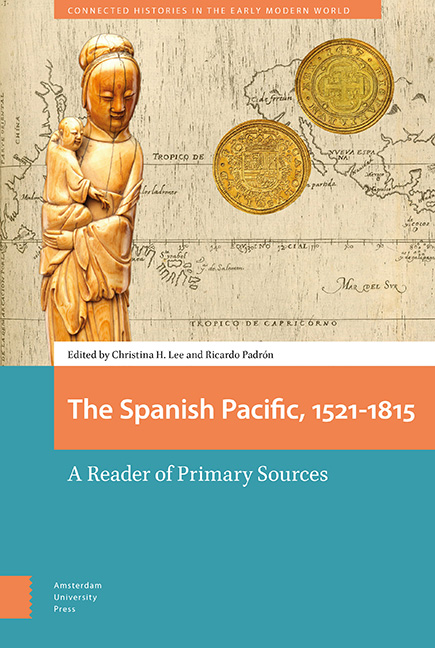Book contents
- Frontmatter
- Contents
- Abbreviations
- Acknowledgements
- Introduction
- 1 An Early Transpacific Account of the Spice Islands by Andrés de Urdaneta (1536)
- 2 Domingo de Salazar’s Letter to the King of Spain in Defense of the Indians and the Chinese of the Philippine Islands (1582)
- 3 Juan Cobo’s Map of the Pacific World (1593)
- 4 A Royal Decree of Philip III Regulating Trade between the Philippines and New Spain (1604)
- 5 Manila’s Sangleys and a Chinese Wedding (1625)
- 6 Don Luis Castilla Offers to Sell Land in Manila (1629)
- 7 Idolatry and Apostasy in the 1633 Jesuit Annual Letter
- 8 The Will of an Indian Oriental and her Chinos in Peru (1644
- 9 Francisco de Combés’s History of Mindanao and Jolo (1667)
- 10 Between Fiction and History in the Spanish Pacific The Misfortunes of Alonso Ramírez (1690)
- 11 A Moluccan Crypto-Muslim before the Transpacific Inquisition (1623–1645)
- 12 Constitutions and Rules of the Beatas Indias (1726)
- 13 The Poetics of Praise and the Demands of Confession in the Early Spanish Philippines: Notes and Documents
- 14 The Pacific Theater of the Seven Years’ War in a Latin Poem by an Indigenous Priest, Bartolomé Saguinsín (1766)
- 15 A Prohibition on Digging Up the Bones of the Dead (1813)
- Index
15 - A Prohibition on Digging Up the Bones of the Dead (1813)
Published online by Cambridge University Press: 20 November 2020
- Frontmatter
- Contents
- Abbreviations
- Acknowledgements
- Introduction
- 1 An Early Transpacific Account of the Spice Islands by Andrés de Urdaneta (1536)
- 2 Domingo de Salazar’s Letter to the King of Spain in Defense of the Indians and the Chinese of the Philippine Islands (1582)
- 3 Juan Cobo’s Map of the Pacific World (1593)
- 4 A Royal Decree of Philip III Regulating Trade between the Philippines and New Spain (1604)
- 5 Manila’s Sangleys and a Chinese Wedding (1625)
- 6 Don Luis Castilla Offers to Sell Land in Manila (1629)
- 7 Idolatry and Apostasy in the 1633 Jesuit Annual Letter
- 8 The Will of an Indian Oriental and her Chinos in Peru (1644
- 9 Francisco de Combés’s History of Mindanao and Jolo (1667)
- 10 Between Fiction and History in the Spanish Pacific The Misfortunes of Alonso Ramírez (1690)
- 11 A Moluccan Crypto-Muslim before the Transpacific Inquisition (1623–1645)
- 12 Constitutions and Rules of the Beatas Indias (1726)
- 13 The Poetics of Praise and the Demands of Confession in the Early Spanish Philippines: Notes and Documents
- 14 The Pacific Theater of the Seven Years’ War in a Latin Poem by an Indigenous Priest, Bartolomé Saguinsín (1766)
- 15 A Prohibition on Digging Up the Bones of the Dead (1813)
- Index
Summary
Abstract
In 1813, the Bishop of Cebu, Joaquín Encabo de la Virgen de Sopetrán, issued an edict prohibiting the exhumation of the dead, written primarily in the local language of Cebuano Visayan. This document from the archives of the Roman Catholic parish of Patrocinio de Maria in Boljoon, a town in the Philippine province of Cebu, suggests that inhabitants of the diocese were digging up the bones of the dead in order to hold rituals for a secondary burial along traditional, non-Christian lines. Ino Manalo discusses the edict in light of the emphasis placed by Spanish colonialism on urbanism and literacy, and outlines the ways in which it provides evidence of the persistence of traditional beliefs and practices centuries after the introduction of Christianity to the Visayas.
Keywords: religion; evangelization; resistance; Visayas
The 1813 document presented here comes from the archival collection of the Roman Catholic parish of Patrocinio de Maria in Boljoon, a town in the Philippine province of Cebu. The parish archive contains church records from the late eighteenth century to the present among which are baptism, marriage, and death registers. Mostly written in the local language—Cebuano Visayan—the document is probably an order from the Bishop of Cebu that was disseminated among the different parishes where it would be copied for future reference. In the case of Boljoon, the order was transcribed in a bound ledger that also contained other records including a 1795 inventory. Though it is assumed that the order was for all the parishes of the diocese, it is also possible that it was directed solely at Boljoon.
The initial lines in Spanish introduce the author as the Joaquín Encabo de la Virgen de Sopetrán, Bishop of Cebu. Encabo was born in Jarandilla de la Vera in Caceres, Spain on 15 August 1740. He was ordained a priest with the Augustinian Recollects in 1768. He was selected bishop of Cebu in 1803 but was only confirmed as such in 1808, holding his post until his death in 1818.
In his order, Bishop Encabo is reprimanding certain members of his flock who have resorted to the practice of digging up the bones of their ancestors presumably to hold rituals for a secondary burial. These rituals have long been practiced in the Philippines as suggested by archaeological data and by ethnographic surveys.
- Type
- Chapter
- Information
- Spanish Pacific, 1521–1815A Reader of Primary Sources, pp. 239 - 244Publisher: Amsterdam University PressPrint publication year: 2020



